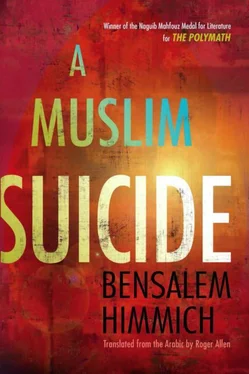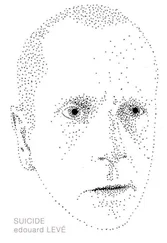By now I have been in Mecca for more than five years. There's no news about either my students in Granada or my family in Sabta and Tangier. My only consolation lies in the fact that I've received a letter from Al-Shushtari in which he tells me that he is settled back in Bijaya and trying to recover from his various health problems. He tells me that he is hoping to join me in Mecca soon. Part of the letter includes a poem that begins

There are other verses too in which he lavishes on me the kind of praise that I pray to God to justify their author's good opinion of me, if only to a certain extent. I will also admit that I got a good deal of consolation from the series of meetings that I used to convene with some students on the roof once a week at lunchtime. The person who was most assiduous in proposing the idea and organizing the session was none other than Yasir from Yemen, the warden, who spared no effort to get things ready and provide all the necessary facilities to make it successful. Among those who used to attend the sessions on a regular basis was that strange Egyptian woman whom I continued to address as Sitt Umama.
I was very careful to make sure that the meetings with this woman in the garden, all within the general context of those lessons, were overseen, indeed overlooked, by the warden in person. I wanted to avoid any suspicion. In my fear of God I asked Him to keep me safe from the temptations of the Devil and the lusts of the flesh. Our discussions were usually somewhat sorrowful, but were nevertheless pleasant enough; there was no dissimulation or formality involved. She would ask me a question about the law, and I would give her a legal opinion; she would ask me to explain some Sufi principles or about previous female ascetics, and I would respond. When she inquired about my family, I told her that I loved my wife deeply and was very attached to her, to which she responded by wishing us both health, long life, and the opportunity to live together once again. Once in a while she came to ask to borrow some of my books or to give me some spiced coconut honey or sweetmeats that she herself had made, prime among them being some special pastries.
Thus I used to spend my days teaching, worshipping, and reading. Whenever I felt weak or ill at ease, I used to go out on exploratory walks around Mecca and the neighboring areas. I walked for miles, and on each occasion I used to turn off by the Mountain of Light; part of the time I would simply sit on the flat stone, but I would also squat in the blessed cave as well. Just listen now, Al-Shushtari, as I briefly talk about this particular spot (and I'll be able to expand on this description when we meet, either in this place or somewhere else):
As I've already told you, my pens had all dried up and my pages had been folded away. However, at this particular place and time, I've started composing again, but based on tablets whose origins lie inside me and whose branches are in my mind. The pen that I am using is subtle, precise, and clear, to the point of being almost invisible. The ink that flows from it could just as well be coming from the Red Sea itself, so plenteous is it, or from some abundant underground well. What I compose is a vast flood, but, when I go back to my private quarters, all I can remember is the headings. Some of them observe my transformations from the onward rushing violence of time to my desire for the clear truth, while others raise high the standards of my defiance and ascent to flutter obstinately in the breeze.
This then was my way of life, with its burning, ascendant motto: anyone who would advise people to continue the struggle and ascend ever upward without doing such things himself is a craven hypocrite. Knowledge is an indication of lofty goals. In the firmament of love one will find nourishment for life and the path to well-being. Those are the things that I have talked about and taught to others. There can be no going back, even if all manner of catastrophes, disasters, and squabbles should gang up against me. My success comes only through God; it is toward Him that I strive and to Him that I turn for consolation and help.
As the sixth year of my stay in Mecca drew to a close [1258 CE], news arrived of the terrible destruction that Baghdad had suffered at the hands of the Mongol hordes under Hulagu Khan.* Everything had been destroyed: crops, property, children, families. The collapsing fortunes of the Abbasid caliphal dynasty had finally been crushed. As a direct result, huge numbers of refugees made their way to the Hijaz region of Arabia, as they tried to escape almost certain death. The city of Mecca received a large number of such people, and Muslims rushed to offer them all the assistance that they could: shelter, food, and medical services. I was among the group charged with medical matters and offering care to the wounded and traumatized. The majority consisted of wounded men, but there were women, children, and old folk as well. At the hospital I did my best to treat them with drugs, plant remedies, and comforting words. The majority of people I dealt with in this way were orphans, widows, and bereaved women. They all had their stories about the utter barbarity of the Tatars and their deliberate terrorist policies involving mass murder and total destruction of everything.
On the third day of my work at the hospital as a doctor and assistant dealing with all the sick and wounded, word reached me that the governor of Mecca, the noble Lord Abu Numa, had arrived. When I looked around, I spotted an imposing figure, with a thick black beard, tall stature, and broad shoulders, coming in my direction, surrounded by his guard. He came over and greeted me, then leaned over to talk to me.
"May God reward you well for coming to the aid of these poor people. Ever since you arrived in Mecca, I have been hearing about your activities. As you know full well, this era of ours is fraught with problems. People in authority like me need the counsel of holy men of God who are loyal. It is even worse to cause a true scholar such as yourself problems than to disturb someone praying humbly to his God. My residence is always open to you, whenever you choose to visit."
He said all this with a spontaneous humility. He now left to resume his visit to the sick and inquire after their state of health, so I duly exchanged farewells with him.
Just before I went to sleep, I recalled the way in which the warden had sung the praises of the governor of Mecca and his senior sharifs. My first instinct, however, was not to forsake the protection of Ibn Khalas in Sabta in order to enter that of Abu Numa in Mecca, even though the latter was clearly more upright and morally sound than the former. My purpose in coming to Mecca had been spiritual; I had no desire whatsoever to get involved in politics and power games.
However, I had no time to refine or consider this instinct in any depth, so I decided to put it aside so that I could devote my attentions to my normal activities, they being the things that I really wanted to do: tending the sick from Iraq in tent-camps or hospital buildings; making my excursions to the mountains and valleys; and teaching an ever larger number of students. In addition to all that, there was also the time I spent in the gardens by the blessed stream of Solomon or in the cemetery at the Bab al-Mu'alla where the tombs of some important figures from the early period of Islam were to be found. Every time I heard that a group of pilgrims had arrived from Andalus and the Maghrib, I made every conceivable effort to get whatever news I could about both regions. Nothing I gleaned from such conversations suggested that there was any cause of joy or hope: Al-Murtada, one of the last would-be Almohads, was now essentially restricted to Marrakesh and a few of its surrounding territories. The Zanati Marinids, with their weak doctrinal background, were bolstering their dynasty with Abu Yusuf al-Mansur.* The overall collapse of Muslim power in Andalus now meant that the region around Granada and its functions was all that remained. Faced with the tyranny of the Nasrid dynasty and the hardships of daily existence, people were living a life of permanent fear. Power and authority lie only with the Creator, the Lord of mankind.
Читать дальше













